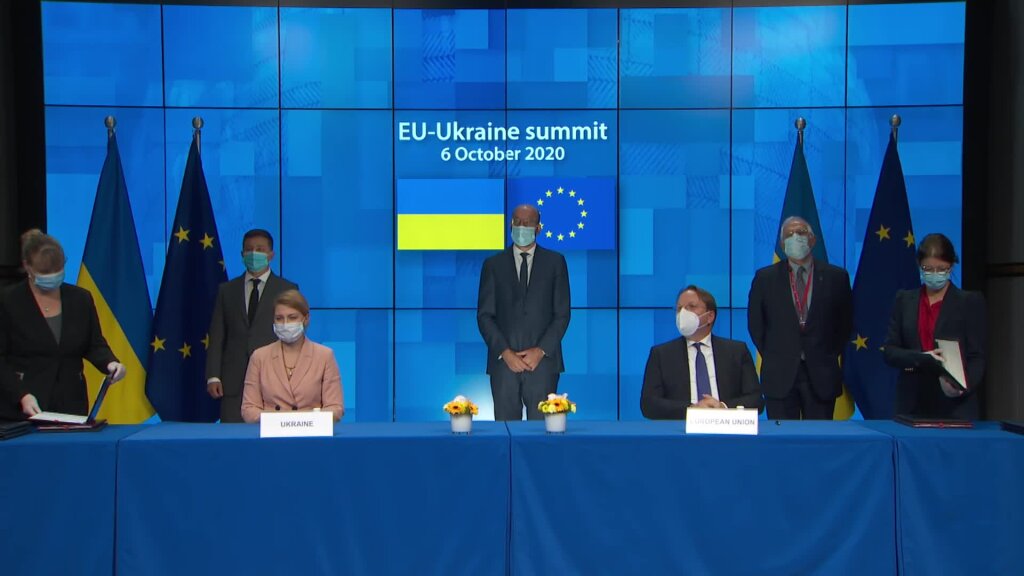Kristen Lew earned her Juris Doctor degree from the University at Buffalo School of Law, SUNY, where she also served as Articles Editor for the Buffalo Human Rights Law Review.
This piece was written in the author’s personal capacity and does not necessarily reflect the views or opinions of any other natural person or entity.
The joint statement issued by the European Union (EU) and Ukraine in the wake of the EU-Ukraine Summit held on 6 October 2020 reiterated the European Commission’s position that greater political and economic integration with Europe is not possible until Ukraine roots out pervasive corruption. The Ukrainian judiciary in particular was highlighted as an area of concern. Failure to institute reform in the judicial branch threatens to rollback anti-corruption progress and aggravate the "Ukraine fatigue" already present in the West.
If there is to be greater economic, political, and social integration with Europe, let alone future membership in the EU, Ukraine will need institute massive reforms quickly, with particular attention to the judiciary. Despite the geopolitical stakes in the region, the West has exhibited a relatively passive approach to Ukraine. As a result, Ukraine ought not to anticipate greater Western assistance in its efforts. In fact, unless the trajectory of anti-corruption efforts is redirected, Ukraine can expect significantly less Western aid.
Public Perception of the Judiciary
The European Commission’s concerns regarding corruption generally and in terms of the judiciary are not without merit. Historically, Ukrainians have been skeptical of the fairness, efficiency, and professionalism of the judicial branch. There has been little improvement in the perception of the courts. Only recently, recorded phone calls from 2019 were released in which judges allegedly conspired to issue decisions for blackmail, kickbacks, and favors. According to a 2020 survey conducted by the Razumkov Centre, 76 per cent of Ukrainians expressed distrust of the judiciary generally. When narrowed down further, 71 per cent of Ukrainians distrusted local courts, 64 per cent distrusted the Supreme Court and the High Anti-Corruption Court, and 60.5 per cent distrusted the Constitutional Court.
Role of Anti-Corruption Bodies in the Context of the Judiciary
In the wake of the 2014 Ukrainian revolution, governmental bodies focused on addressing corruption were created, in part to address corruption’s pervasive presence in the judicial branch. One such body was the National Anti-Corruption Bureau of Ukraine (NABU), an autonomous investigative body. While it is not without flaws and suffers a relative lack of trust from the populace, NABU is notable for its independence and successful high-profile investigations against top oligarchs.
Like NABU, the Specialized Anti-Corruption Prosecutor’s Office (SAPO) specifically targets corruption. SAPO functions within the Prosecutor General’s Office and operates to prosecute cases investigated by NABU. Thus, NABU and SAPO are complimentary components of facilitating the adjudication of corruption cases through the investigation and prosecution stages. NABU was dealt a harsh blow in a recent decision in the Constitutional Court, finding that the former president of Ukraine, Petro Poroshenko, exceeded his powers in setting up the bureau.
Impact of Ruling Relative to the High Anti-Corruption Court
With NABU’s existence uncertain in light of the recent constitutional court decision, another issue looms – namely, the future of the High Anti-Corruption Court (HACC). The HACC was established in 2019 and hears corruption cases exceeding a monetary threshold, particularly in circumstances concerning high-ranking officials or other public figures. Importantly, judges in this court are subject to significant vetting and selection procedures overseen by a body comprised of foreign experts. The HACC depends on the work of both NABU and SAPO to adjudicate cases. Continued financial aid for Ukraine from the International Monetary Fund (IMF) and the EU largely relies on the HACC’s continued efforts to fight corruption.
It is difficult to definitively ascertain the effectiveness of the HACC due to its recent formation; though, it has notably issued 17 verdicts with many more cases on its docket. Irrespective of this, the HACC is also important for the symbolic and novel role it serves as a court committed to its anti-corruption mission and its separation from the poor reputation of other components of the judiciary. While still suffering a degree of distrust, it nonetheless enjoys a better reputation than other courts. While the HACC’s long-term success is uncertain, controversy surrounding the rest of the judiciary makes it unlikely other courts would be either willing, able, or trusted by Ukrainians and the international community to tackle corruption.
Moving Forward
Despite recent setbacks, it is crucial not to lose ground and risk losing progress made combatting corruption and building a better relationship with Europe. In the years since the Ukrainian revolution, Ukraine has made significant inroads to political and economic cooperation with Europe. Since 2017, Ukrainian nationals are now visa-exempt for short stays in the Schengen zone. Under the Association Agreement, which also entered into force in 2017, free trade between Ukraine and the EU was implemented in various sectors and tariffs were cut, opening markets.
In order to strengthen these ties, Ukraine must now align its norms, standards, and legislation to EU standards, which is unlikely without a judiciary free from both actual corruption as well as the perception of corruption. Undermining the HACC’s potential through the potential destruction of NABU, and thus SAPO, would likely be a massive setback in Ukraine’s quest for strengthened ties with Europe. It would also place much needed aid in jeopardy, in turn further impeding corruption reform efforts. Thus, Ukraine must work to protect the existence of an independent investigative body and preserve the HACC as an independent court to allow effective adjudication of corruption cases in furtherance of its efforts for greater European integration.



